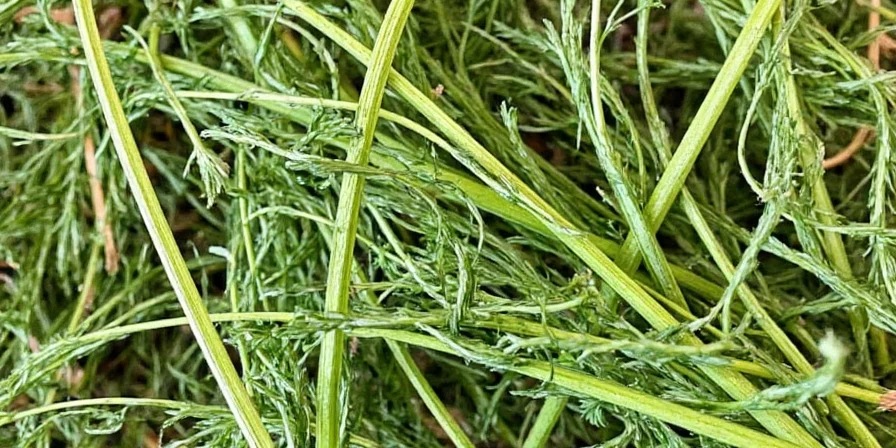Unlocking the Flavor: A Comprehensive Guide to Dried Dill in Your Spice Cabinet
Dill is a fragrant herb that often finds itself in the spotlight of culinary traditions worldwide. From its delicate leaves to its bold seeds, dill offers a unique flavor profile that can elevate a myriad of dishes. In this blog post, we will explore dried dill, its uses, storage hacks, and more. Whether you're a novice cook or a seasoned chef, understanding how to effectively utilize dried dill in your cooking can make a world of difference.
What is Dried Dill?
Dill (Anethum graveolens) is an herb that belongs to the celery family, Apiaceae. While fresh dill is often a favorite for its vibrant flavor and aroma, dried dill has its own set of advantages. Dried dill is made by harvesting the leaves and flowers of the dill plant and then drying them to preserve their flavor and aroma, making it a staple in many spice cabinets.
Why Choose Dried Dill?
- Convenience: Dried dill is easy to store and has a long shelf life, making it a practical choice for home cooks.
- Concentration of Flavor: The drying process concentrates the flavor, making a little go a long way.
- Versatility: Dried dill can be used in a variety of dishes, from soups to salads to marinades.
How to Store Dried Dill
Proper storage of dried dill is essential to maintain its flavor and potency. Here are some tips to ensure your dried dill remains fresh for as long as possible:
1. Choose the Right Container
Store dried dill in an airtight container to protect it from moisture and air exposure. Glass jars, metal tins, or resealable plastic bags work well. Make sure the container is opaque, as light can degrade the herb's quality over time.
2. Keep It Cool and Dry
| Storage Conditions | Ideal | Avoid |
|---|---|---|
| Temperature | Cool | Heat sources |
| Humidity | Low | Moist areas |
| Light | Dark | Direct sunlight |
Make sure to store your dried dill in a cupboard or pantry away from the stove and other heat sources. Excessive heat can lead to the loss of flavor and aroma.
3. Check Expiration Dates
Dried herbs typically have a shelf life of 1 to 3 years. Always check the expiration date on the packaging and replace your dried dill as needed to ensure optimal flavor.
Using Dried Dill in Your Cooking
Dried dill is a versatile ingredient that can enhance the flavor of various dishes. Here’s how to incorporate it into your cooking:
1. Dill in Dressings and Marinades
Dill pairs exceptionally well with creamy dressings and marinades. Consider using dried dill in:
- Ranch Dressing: Mix dried dill with buttermilk, mayonnaise, garlic powder, and other seasonings for a refreshing dressing.
- Marinades: Combine dried dill with olive oil, lemon juice, and garlic for a flavorful marinade for chicken or fish.
2. Dill in Soups and Stews
Dried dill can add depth and flavor to soups and stews. Consider these ideas:
- Chicken Soup: Add dried dill to your chicken soup for a fresh, herbal note.
- Potato Soup: Blend dried dill into potato soup for an interesting flavor twist.
3. Dill with Vegetables
Dill complements many vegetables beautifully. Try these combinations:
- Cucumber Salad: Mix dried dill with yogurt, garlic, and cucumbers for a delicious salad.
- Roasted Vegetables: Sprinkle dried dill over roasted carrots or potatoes before serving.
Health Benefits of Dried Dill
Beyond its culinary uses, dried dill also boasts several health benefits:
1. Antioxidant Properties
Dill contains compounds that have antioxidant properties, helping to fight free radicals in the body.
2. Digestive Aid
Dill has traditionally been used to alleviate digestive issues, including bloating and gas. Adding dried dill to meals may help with digestion.
3. Anti-inflammatory Effects
Some studies suggest that dill may have anti-inflammatory properties, which can benefit overall health.
How to Make the Most of Dried Dill
To fully enjoy the flavor of dried dill, consider these tips:
1. Rehydrate Before Use
If you're using dried dill in a dish that requires cooking, consider rehydrating it first. Simply soak it in warm water for 10-15 minutes before adding it to your recipe. This can help release its flavor more effectively.
2. Pairing with Other Herbs
Dill works well with other herbs and spices. Here are some pairing suggestions:
- Chives: A great match in dips and dressings.
- Garlic: Enhances the flavor in savory dishes.
- Thyme: Works beautifully in roasted dishes.
3. Experiment with Quantities
Since dried dill has a concentrated flavor, start with a small amount (about 1 teaspoon) and adjust according to your taste. It’s easier to add more than to take it out!
Conclusion
Dried dill is a fantastic addition to any spice cabinet, offering convenience, flavor, and versatility. By following the storage tips and usage hacks outlined in this blog, you can ensure that your dried dill remains fresh and flavorful for all your culinary adventures. From enhancing dressings to adding depth to soups, dried dill is an herb that can truly transform your cooking.
So, next time you reach for your spice rack, don’t overlook dried dill—it just might be the secret ingredient you didn’t know you needed!
Illustration

Note: Always ensure to use high-quality dried dill for the best flavor and health benefits.










 浙公网安备
33010002000092号
浙公网安备
33010002000092号 浙B2-20120091-4
浙B2-20120091-4